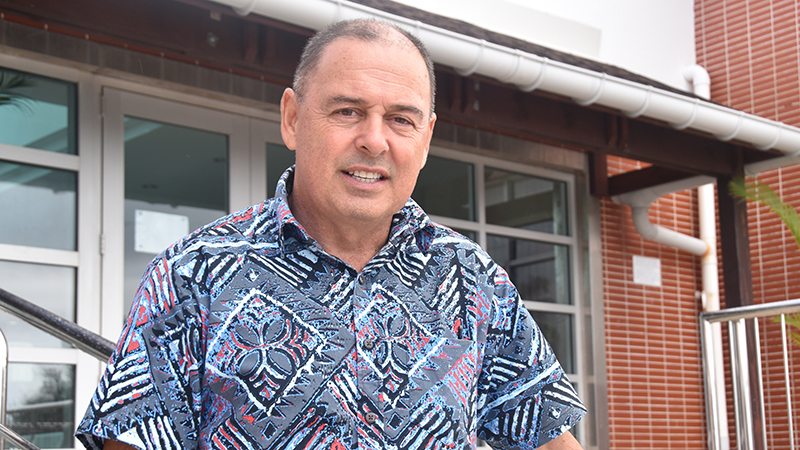The strength and endurance of our nation’s Christianity
Tuesday 19 October 2021 | Written by Supplied | Published in Opinion

(File photo) Prime Minister Mark Brown. Photo: LOSIRENE LACANIVALU / 21031938
The coming celebrations in Aitutaki are both a time for reflection on the past and a time to look forward to a future world, to honour what our spiritual heritage has given us today and also to consider how that rich and fruitful heritage might help guide our footsteps tomorrow, writes Prime Minister Mark Brown.
Kia orana,
In exactly one week’s time we will celebrate 200 years since the arrival of the Gospel into the Cook Islands, commemorating the arrival in Aitutaki of the Tahitian missionaries Papeiha and Vahapata, who were brought to the island by the Reverend John Williams of the London Missionary Society on October 26, 1821
Welcomed by Tamatoa Ariki, these men spent the next two years preaching the Gospel of Jesus Christ to the people of Aitutaki and during that time led the construction of our oldest church in Arutanga.
In the years that followed, the Reverend Williams also brought the Gospel to our islands of Atiu, Mitiaro, Mauke and Rarotonga. Other missionaries later spread the Word to Mangaia, Manihiki, Rakahanga, Tongareva, Pukapuka, Nassau and Palmerston, converting almost the entire nation within the span of a few decades.
Two centuries later, the work of these early missionaries continues to echo down the years.
Largely embraced by our Ui Ariki from the very beginning, Christianity helped bring about an entirely new way of life in the Cook Islands by the mid-1800s, reducing conflict and fostering peace and harmony between our different island communities.
In 1839 the Takamoa Theological College was established in Rarotonga. Now the second oldest institution in the Pacific, it has produced thousands of Cook Islands-educated pastors, church leaders and evangelists who have spread throughout the region to preach the Word of Our Lord Jesus Christ.
In 1852 the London Missionary Society then founded the Cook Islands LMS Church, which would later become the Cook Islands Christian Church we know today via an act of Parliament in 1968. The CICC now has an estimated 18,000 members with 23 church branches in the Cook Islands and 26 branches each in both New Zealand and Australia.
Also in 1968, the Cook Islands Religious Advisory Council was founded to help advise our political and traditional leaders on key issues affecting the social and cultural development of our people, as well as to oversee the many religious events, undertakings, observances and community programmes that are so much a part of our everyday life here in the Cook Islands.
Yes, there is no doubt that we are a Christian people.
And the history and strength of our Christianity was brought home to me on my recent visit to the island of Tongareva.
On the way from Tetautua village to Omoka, we were able to visit the motu Mangarongaro and also Tepuka to view two of the earliest churches built by hand by the communities on those motu during the late 1800s. All that stands today are the sturdy rock walls plastered with ngaika, a limestone paste.
The last services held in these churches was before 1900 when the settlements on the various motu of Tongareva were resettled to the two villages that we know today.
The walls stand silent but strong after being abandoned for more than 100 years. Abandoned but not neglected – they are kept clean by the island even after all these years.
The buildings are a silent but striking testament to the strength and endurance of our nation’s Christianity, even in our most remote communities. These are certainly two historic sites that are worthy of recognition as heritage sites.
Our Christian spirit is also exemplified by our core Kia Orana Values.
Kia Orana is the unity of heart, mind and soul within each one of us. It is the act of positively reaching out to others and encapsulates our shared understandings as a nation. Kia Orana is the essence of our people and islands.
An important aspect of this is irinakianga vaerua – the quality of being concerned with the human spirit or soul as opposed to material or physical things. I believe this quality of spirituality and faith in oneself is a sustaining notion of what it means to be a Cook Islander.
There is also no doubt that the history of Christianity in the Cook Islands is aligned with our history as a modern nation.
Accordingly, this bicentennial milestone now upon us is to be celebrated not only as a marker of when the Gospel first arrived on our shores, but also as an indicator of the growth and development our country has experienced since that very special day 200 years ago.
The coming celebrations in Aitutaki are therefore both a time for reflection on the past and a time to look forward to a future world, to honour what our spiritual heritage has given us today and also to consider how that rich and fruitful heritage might help guide our footsteps tomorrow.
May the fruits of the Gospel continue to grow and enlighten our people in the name of Our Saviour the Lord Jesus Christ.
Kia Manuia.












































